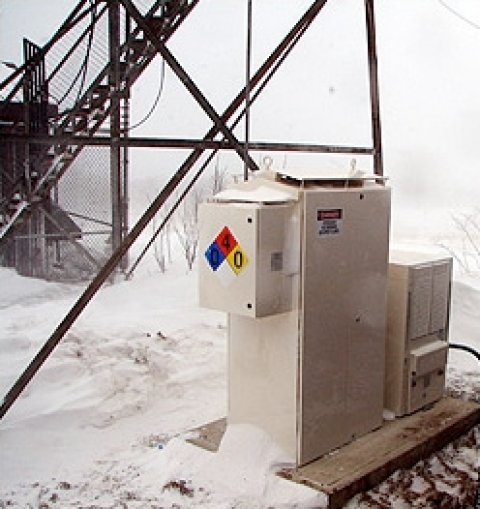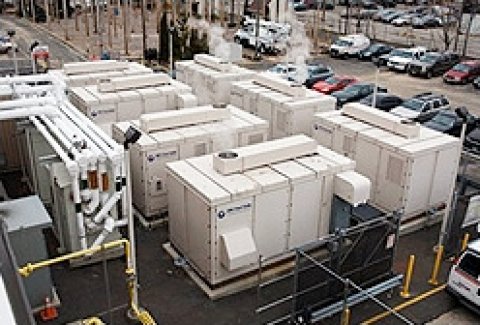Hydrogen and Fuel Cell Technologies Office market transformation efforts focus on several key early market applications:
Specialty Vehicles
For specialty vehicles such as forklifts, fuel cells can be a cost-competitive alternative to traditional lead-acid batteries because:
- Batteries have a limited range, take substantial time to recharge and cool before reuse, and are prone to voltage drops as power discharges.
- Unlike batteries, fuel cells can be rapidly refueled, eliminating the time and cost associated with swapping batteries.
- The voltage delivered by the fuel cell is constant as long as hydrogen fuel is supplied. Using fuel-cell-powered forklifts can boost productivity by eliminating trips to the battery changing station. And with no need for battery chargers, storage, or changing areas, more warehouse space is available for other uses.
For these reasons, fuel cells can be cost-competitive with batteries on a lifecycle basis, particularly for continuously used forklifts that operate two or three shifts a day and require multiple battery change-outs.
Learn More about Using Fuel Cells in Specialty Vehicles
These publications provide more information about fuel-cell-powered forklifts.
- Early Markets: Fuel Cells for Material Handling Equipment — This fact sheet provides an overview of fuel cells as an alternative to batteries and combustion engines for material handling equipment. It features a lifecycle-cost-analysis comparison table.
- Full Fuel-Cycle Comparison of Forklift Propulsion Systems — This report examines forklift propulsion systems and addresses the potential energy and environmental effects of substituting fuel cell propulsion for existing technologies based on batteries and fossil fuels. View the summary presentation.
Emergency Backup Power
Fuel cells are a potentially viable option for backup power, particularly in the telecommunications sector. Traditional backup power technologies use batteries and generators that operate on diesel, propane, or gasoline. Most backup-power communication and control systems use a combination of generators and batteries to provide redundancy and avoid service disruptions. Although these systems are reliable and well-established, growing concerns about batteries and generators are motivating many customers to seek alternatives that provide high reliability and durability at reasonable cost.
Compared with batteries, fuel cells offer longer continuous runtime and greater durability in harsh outdoor environments. And with fewer moving parts, they require less maintenance than generators or batteries. They can also be monitored remotely, reducing maintenance time. Compared with generators, fuel cells are quieter and have no emissions.
On a lifecycle basis, fuel cells can offer significant cost savings over both battery-generator systems and battery-only systems when shorter runtime capabilities of up to 72 hours are sufficient (fuel cell system costs for longer runtimes can be higher than incumbent technologies due to the cost of hydrogen storage tank rentals).
Learn More About Using Fuel Cells for Emergency Backup Power
These publications provide more information about using fuel cells for backup power.
- Backup Power Cost of Ownership Analysis and Incumbent Technology Comparison — This cost of ownership analysis identifies the factors impacting the value proposition for fuel cell backup power and presents the estimated annualized cost of ownership for fuel cell backup power systems compared with the incumbent technologies of battery and diesel generator systems.
- Early Markets: Fuel Cells for Backup Power — This fact sheet describes the advantages of using fuel cell technology for application in emergency backup power.
- Fuel Cycle Comparison for Distributed Power Technologies — This report examines distributed power technologies for backup and prime power and addresses the potential energy and environmental effects of substituting fuel cells for existing technologies based on batteries and fossil fuels. View the summary presentation.
- Fuel Cells for Critical Communications Backup Power — This presentation provides an overview and examples of using fuel cells for emergency backup power for critical communications. It was presented by Greg Moreland at the Association of Public Communications Officials Annual Conference in August 2008.
- Codes and Standards Permitting Tools — To help local permitting officials deal with proposals for hydrogen fueling stations, fuel cell use for telecommunications facilities, and other hydrogen projects, DOE has developed codes and standards permitting tools that help identify model codes and standards pertinent to such projects.
Prime Power for Critical Loads
Fuel cells can replace grid electricity for dedicated, on-site, premium-power generation at large energy consuming or "critical load" facilities. Critical load facilities include data centers with electronic equipment, servers, and other computing activities; high-volume financial processing centers; defense or security communications facilities; air traffic control centers; hospital intensive-care units; and prisons and remote law enforcement campuses—places where grid failure, even for a short time, can result in significant financial loss or security vulnerability.
In these applications, fuel cells can provide high-quality, reliable, grid-independent, on-site power, with reduced emissions over conventional power technologies. In addition, waste heat from fuel cells can be captured to provide heating and cooling of ancillary equipment and facilities, increasing energy efficiency to as high as 85%. These fuel cell systems can also enhance grid reliability—the on-site power generation augments grid electricity, making it available for other demands in grid-deficit areas of the country.
Fuel cells can use bio-derived methane or anaerobic digestion gas found in sewage, food and beverage processing, crop and animal agriculture, and municipal landfill waste streams to generate electricity and meet the heating and cooling needs of industry sites, government facilities, or campus operations. Combining a fuel cell system with digester, chilling, and heating technologies can greatly increase efficiencies while eliminating sizable amounts of methane that would otherwise be released to the atmosphere.
Learn More About Using Fuel Cells for Prime Power
These publications provide more information about using fuel cells for prime power.
- Case Study: Fuel Cells Provide Combined Heat and Power at Verizon's Garden City Central Office — This case study explores a large stationary fuel cell application that provides primary power, heating and cooling for the offices of Verizon Wireless.
- Case Study: Fuel Cells Increase Reliability at First National Bank of Omaha — This case study details a fuel cell system that provides primary power to a large data center.
- Fuel Cycle Comparison for Distributed Power Technologies — This report examines distributed power technologies for backup and prime power and addresses the potential energy and environmental effects of substituting fuel cells for existing technologies based on batteries and fossil fuels. View the summary presentation.
- First National Technology Center — This presentation provides an overview of the fuel cell system at the First National Technology Center in Omaha, Nebraska. Dennis Hughes, lead property manager at First National Buildings Inc., gave the presentation to the State and Regional Initiatives Group in November 2007.
- Keeping the High-Tech Industry Plugged-In with Onsite Energy — This project profile provides an overview of the seven 200-kW fuel cell combined heat and power system at the Verizon Call Center in Garden City, New York. Verizon received an ENERGY STAR award for this installation in June 2008.
- Sierra Nevada Brewery — This website provides information about the four 250-kilowatt fuel cells that supply electric power and heat to the brewery. The fuel cells use waste methane generated at the brewery's waste-water treatment plant as a fuel source.
Learn More About Early Market Applications
These publications provide more information about using proton exchange membrane (PEM) fuel cells in early market applications.
- Identification and Characterization of Near-Term Direct Hydrogen PEM Fuel Cell Markets — This report provides in-depth information about the near-term markets for PEM fuel cells, with a focus on power supplies for forklifts and backup power for telecommunications and emergency response radio towers. View the summary presentation.




